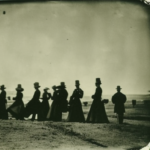One-line summary:
“Summer” is a captivating novel that explores the complexities of love, desire, and societal expectations in a small New England town during the early 20th century.
The Pursuit of Love and Desire
Set in the fictional town of North Dormer, “Summer” follows the story of Charity Royall, a young woman who grows up in poverty and is taken in by the local lawyer, Mr. Royall. As Charity blossoms into a beautiful young woman, she becomes increasingly aware of her desires and longs for a life beyond the confines of her small town. When Lucius Harney, a sophisticated architect from the city, arrives in North Dormer to work on a project, Charity’s world is turned upside down. She is immediately drawn to him, and their passionate affair challenges the boundaries of societal norms and expectations.
As Charity and Lucius embark on their secret relationship, they navigate the complexities of love and desire. Edith Wharton skillfully portrays the intensity of their connection, capturing the raw emotions and the forbidden nature of their affair. Through their interactions, Wharton explores the themes of sexual awakening, the power dynamics between men and women, and the consequences of pursuing one’s desires in a society that values conformity.
The Constraints of Society
Wharton also delves into the restrictive nature of society in “Summer.” Charity, as a young woman from a lower social class, is constantly reminded of her place in society. She is expected to conform to the expectations of her community, which include marrying someone from her own social circle. However, her relationship with Lucius challenges these conventions, as he represents a world beyond her own.
The novel highlights the limitations placed on women during this time period, as they were expected to prioritize marriage and motherhood over personal fulfillment. Charity’s struggle to reconcile her desires with societal expectations reflects the broader theme of the individual’s struggle against the constraints of society.
The Search for Identity
Throughout the novel, Charity grapples with her own identity and her place in the world. As an orphan, she is constantly reminded of her lack of roots and her outsider status in North Dormer. Her relationship with Lucius offers her a glimpse of a different life, one that is more exciting and fulfilling. However, she also faces the fear of losing herself in the process of pursuing her desires.
Wharton explores the theme of self-discovery and the search for identity through Charity’s journey. As she navigates the complexities of love and societal expectations, Charity must confront her own desires and make choices that will shape her future.
- Love and desire can challenge societal norms and expectations.
- Society often imposes constraints on individuals, particularly women.
- The search for identity is a complex and ongoing process.
“She had always thought of love as something confused and furtive, and he made it as bright and open as the summer air.”
In “Summer,” Edith Wharton masterfully explores the themes of love, desire, societal constraints, and the search for identity. Through the captivating story of Charity Royall, readers are transported to a small New England town where the pursuit of love and personal fulfillment collide with the expectations of society. Wharton’s vivid prose and nuanced characters make “Summer” a compelling read that delves into the complexities of human relationships and the timeless struggle between individual desires and societal norms.












